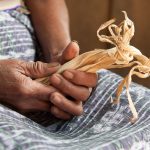Theatre and Community at a Nigerian University
The dramatization of the passion and suffering of Christ in the open field by students of the University of Uyo as part of the Easter festivities in Uyo, Akwa Ibom State, Nigeria. Photo by Ofonime Inyang.
By Ofonime Inyang
Theatre and culture are societal concepts that often go hand in hand. Playing complementary roles in community building, they act as unifying forces. Culture is the precursor of theatre and also acts as the touchstone of theatrical thinking and doing.
The earliest form of the modern theatre practice and the scholarly dimension of its manifestation in universities can be traced back thousands of years to the Greek festival of Dionysus and the gladiatorial contests of classical Roman society. Within Africa, theatre is also grounded in festivals, social outings and seasonal passages that commemorate the cycles in communal sociology.
To this extent, theatre brings people together and creates the space for them to meet, see, think, reflect, relate and review how society should function. Professor Inih Ebong, an independent scholar and former head of the Department of Theatre Arts at the University of Uyo, is of the opinion that the peculiar magic of the theatre is that the community creates the space for it and in turn reinvents itself through it. Theatre is a meeting point of ideas, a creative assemblage of the philosophies and values that regulate the daily running of society and a cardinal institution of cultural preservation in all times and ages.
It is from this context that I share some insights on the role of drama and theatre in fostering culture preservation and collegial relationship within the University of Uyo, a local liberal arts college located in the capital city of Akwa Ibom State, one of the littoral states in the geopolitical South-South of Nigeria.
The University of Uyo is a federal university that was created from an existing state college to cater to local training and manpower needs. It draws the majority of its students from the communities that make up the state, neighbouring states and other parts of the Nigerian federation, including Cameroun, Benin Republic, Equatorial Guinea and Gabon. It runs under the centralized Nigerian academic system managed by the National Universities Commission and parades programs that are considered significant and relevant to the manpower needs, development goals, strategic advantage and cultural orientation of our society.
The university hosts programs in various disciplines, cutting across the sciences, mathematics, engineering, humanities and the arts, preparing students to integrate and connect across cultural boundaries, given Nigeria’s multi-ethnic composition, in a bid to foster inclusion and sustenance of federal character. One of its programs devoted to ensuring this is theatre studies.
The theatre studies program, which marked its silver jubilee this year, emerged from the cultural studies sub unit of the Centre for Cultural Studies in the early years of the university’s transition to federal status in the ’90s. It is devoted to scholarly investigations and practical modules in theatre, culture and creative production and runs a diploma, undergraduate and master program in various specializations including acting, directing, playwriting, costume and makeup, applied theatre, theatre in education indigenous dances and arts management.
The program runs an annual showcase of various creative productions in what is popularly called the “play production season,” which is not only a departmental showcase but a well-organized and curated creative festival that brings the university community and Uyo residents together in a sort of town-and-gown relationship and interaction.
The various artistic productions, whether in the form of dance, music, drama, costume parade or indigenous theatre re-enactment, create a unique atmosphere not only in enhancing the department’s scholarly objectives, but also achieving the goal of bringing people together.
This year’s play production season was notably strong in driving home the message and goal of collegial relationship, not only in the diversity of the plays and productions on parade, but also to the extent that sister departments in the Faculty of Arts, namely the departments of English, music, fine arts and environmental studies, participated and presented plays.
The Department of English presented two plays involving first-year students, which were directed by a staff of the theatre program. Students from the departments of music and fine arts were also involved in aspects of the production and a postgraduate student in environmental studies took interest in the representation of nature and the environment in the plays as part of her research.
With more than 10 plays, about four student-led screen productions and a dance piece, the season offered a rich tapestry of local arts thinking, adaptations and a foreign classic. Each production brought a unique interplay of arts, life and social construct in scintillating performances that drew a wide audience. Parents, teachers, community and religious leaders, and various cadres of persons in and outside the university environment, came to mingle with students in appreciation of the students’ talent, training and skills.
A mix of English-language productions with those of the indigenous Ibibio language, or a blend of both, offered a glaring contextualization of the reality of globalization and multiculturalism.
Themes centred around relationship, family and communal coexistence. Mary Edmund, a student in the Department of Theatre Arts graduating class, wrote and directed the play Family, which explored the complexity of modern living and its challenges to the lives of family members finding their hopes in a society in economic recession. Paul Asekome’s direction of Victor Dugga’s screenplay Hope Harvesters brought new insight into the African perception of marriage from a collective position as against the increased desires of young people to choose their life partners and run with the responsibility. In Akan, a play founded on the Ibibio cosmo-vision and supernatural import of strength and beingness as practised in the Nkim Itong* lore, Christian Jessy attempted a rewriting of this prehistoric mythology to suit contemporary human challenges. Lucy Peter’s dance piece Plague delved into a nuanced extrapolation of marital relationship turned ugly by an overtly and extremely abusive husband whose wife’s retaliation leads to his violent end.
Other performances all tilted toward themes that centre-staged relationship in one way or the other. That they also brought into focus the expansive universe of drama and theatre as unifying forces in the human community acted in many ways to foreground the role of the humanities in human development, especially in a time of its contested relevance.
The play production season left in its trail various open windows of community and relationship building as both staff and students joined efforts to work toward the fulfilment of the theatre’s axiom of the show must go on, no matter the situation. It addressed salient socio-political issues that ages of political thinking have failed to tackle within the Nigerian space and even incorporated the Christian ethos of sacrifice, love and forgiveness as enacted in an open Easter dramatization that captured the travails of Christ.
The end of the production season left indelible memories, but the overall impact it has created by bringing people from different backgrounds together to enjoy arts and creativity is a positive picture of what humanity can become when relationship is allowed to cross various borders and boundaries.
* Nkim Itong is a cultural display/performance among the Ibibio people, the major ethnic group in Akwa Ibom State where the University of Uyo is based. It stems from the local belief in nature, supernatural agents and the power of humans to overcome evil with the help of ancestral connections.
Ofonime Inyang is a theatre and communication teacher in the University of Uyo, Nigeria. He is a writer, director and essayist with many plays, poems, essays and creative productions to his credit. He is currently the General Secretary of the Association of Nigerian Authors (ANA) and a member of several research and artistic organisations in and outside Nigeria. He is the Chairman of the Departmental Production Committee and coordinates the Play Production Season in the Department of Theatre Arts, University of Uyo.




